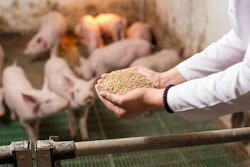
Soon after the first cases of ASF were recorded in the Americas, animal health agencies joined stakeholders in the region to halt the further spread of the disease.
In Europe, new cases of African swine fever (ASF) have been detected in domestic pigs in Poland, Romania and Russia, as well as in the latter’s Far Eastern federal district. Among the wild boar population, ASF has spread to a new district in Germany.
After recent confirmation of ASF in the Dominican Republic, the World Organisation for Animal Health (OIE) called for urgent action to bring the disease under control.
These latest cases represented the recurrence of the disease after 40 years, and it was the first outbreak of ASF in the Americas. OIE urged countries in the region to increase surveillance.
Together with the United Nation’s Food and Agriculture Organization (FAO), OIE is offering assistance in the region through the Global Framework for the Progressive Control of Transboundary Animal Diseases (GF-TADs).
The disease does not represent a threat to human health. However, with its high transmissibility and causing up to 100% mortality in members of the pig family, ASF has threatened the livelihoods of swine owners and farmers across Asia, Africa and Europe since 2018, according to the OIE.
However, the organization says that it is still possible to control the spread of ASF to new countries in the Americas. This will require “proactive, concrete and coordinated actions by all regional stakeholders,” it says.
ASF virus detected in new district of Germany
Last week, the national veterinary agency, the Friedrich-Loeffler Institute confirmed the first cases of ASF in wild boar in the Brandenburg state district of Barnim. According to the federal agriculture ministry, the location is only a few kilometers from the German-Polish border. Brandenburg authorities have adapted existing measures to cover the enlarged disease control area.
Together with one municipality in neighboring Saxony, this brings to seven the number of German districts registering cases of the disease in the wild population to seven.
Total cases of ASF among wild boar in Germany stands at 1,793 animals, based on the latest updates from the respective administrations of the two states registering cases so far. This figure has risen by 75 compared with July 26.
Since the state’s first case of ASF in September 2020, the agriculture ministry of Brandenburg records its total as 1,423 confirmed cases, as of August 2.
Saxony is the only other state in Germany where ASF-positive cases have been detected among wild boar. Also as of August 2, its total had reached 370 cases, reported the state’s agriculture ministry.
Among the domestic pig population, Germany confirmed three outbreaks — all in Brandenburg during July. Based on reports to the OIE, these involved a total of 315 pigs. Four died and the rest have been destroyed.
Polish ASF outbreak total rises to 40
Over the past week, nine new outbreaks of ASF have occurred among Poland’s domestic pigs, according to the country’s chief veterinary office.
Latest infections have been in herds of 9-33 pigs in five different provinces, all of which had registered previous outbreaks this year.
Involving a total of 30,180 pigs, there have been 40 ASF outbreaks since March. Cases have been confirmed in 10 provinces, including in seven large herds (of around 1,000 animals or more).
Among Poland’s wild boar, a further 50 new outbreaks affecting 60 individuals have been confirmed by the veterinary office. The animals were found or shot in the period July 2-27 in seven provinces. Worst affected continues to be Lubusz in western Poland. Bordering Germany, it accounts for 1,162 of the 1,880 ASF outbreaks among Polish wild boar so far this year.
ASF outbreak total in Europe’s domestic pigs in 2021 passes 800
So far this year, 839 outbreaks have been confirmed among domestic pigs, according to the latest update of the Animal Disease Information Notification System from the European Commission (EC; as of July 30). Compared with the previous week, this is an increase of 113 outbreaks.
Over this period, the number of countries that have registered outbreaks in 2021 has risen by one — Latvia — to nine. Romania now accounts for 751 outbreaks out of Europe’s total.
During the whole of 2020, 1,240 ASF outbreaks in pigs were registered with the EC by 10 European countries.
Since last week, Romania’s veterinary authority has officially registered with the OIE 75 new ASF outbreaks in domestic pigs. Included was one cluster of 47 outbreaks in one location in the south of the country. Involving a total of 421 pigs, affected herds ranged in size from one to 58 animals.
In Ukraine, a further outbreak has been confirmed to the OIE. This was in the only pig at the premises in the southern oblast of Kherson.
ASF situation in Europe’s wild boar
As of July 31, 12 European countries had registered 8,284 ASF outbreaks in wild boar with the EC system in 2021. By far registering the most cases so far in 2021 is Hungary with 2,461 outbreaks. Poland’s total has reached 2,009, and Slovakia’s 1,281.
Also confirming new cases so far during July have been Germany (with a total of 1,148 outbreaks so far this year), Romania (827), Bulgaria (188), Latvia (162), Lithuania (91), Estonia (39) and Ukraine (2).
Earlier this year, Italy and Serbia registered cases in wild boar with the EC.
For comparison, 14 of the region’s states recorded a total on 11,027 outbreaks during the whole of 2020.
ASF hits more backyard herds, wild boar in western Russia
Three further outbreaks of ASF in the west of the country have been registered to the OIE by Russia’s animal health agency.
All were in herds described as “backyard” — generally small non-commercial units with no more than a few animals. Two of the latest outbreaks occurred in the oblasts of Saratov (Volga federal district), and Yaroslav (Central district). In the Northwestern district of Novgorod, the one recently affected herd comprised 256 pigs.
Meanwhile, further wild boar have tested positive for the ASF virus in the Central federal district — in Kaluga and Yaroslavl.
The EC system does not monitor the ASF situation in Russia.
More backyard herds affected by ASF in Russia’s Far East
It has been two years since ASF was first detected in the Far Eastern federal district of Russia.
Over the past week, eight outbreaks have been registered with the OIE by the national veterinary authority. All were in backyard herds of up to 34 pigs.
Testing positive for the ASF virus were animals at two locations in Khabarovsk oblast during July. In Primorsky krai, the disease has been detected in six backyard herds since the end of April.
Philippines province counts the cost of ASF
In the north of the island of Luzon, the province of Ilocos Norte is counting the cost of ASF. According to the Philippine News Agency (PNA), this amounts to more than PHP40 million (US$804,000).
Since June, the regional veterinarian reports, approximately 4,000 pigs have been culled as a result of the disease. From one town, the disease spread to a further four in the east of the province.
Owners of these affected herds are offered some support with alternative livelihoods. Meanwhile, other farmers are urged to continue with biosecurity measures, and avoid feeding swill containing meat to pigs. Furthermore, PNA reports, the authorities are warning owners about illegal activities by some online pig and pork traders.
View our continuing coverage of the global African swine fever situation.

















